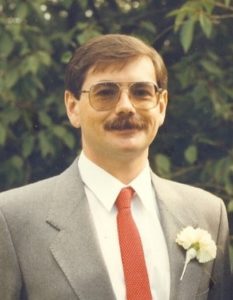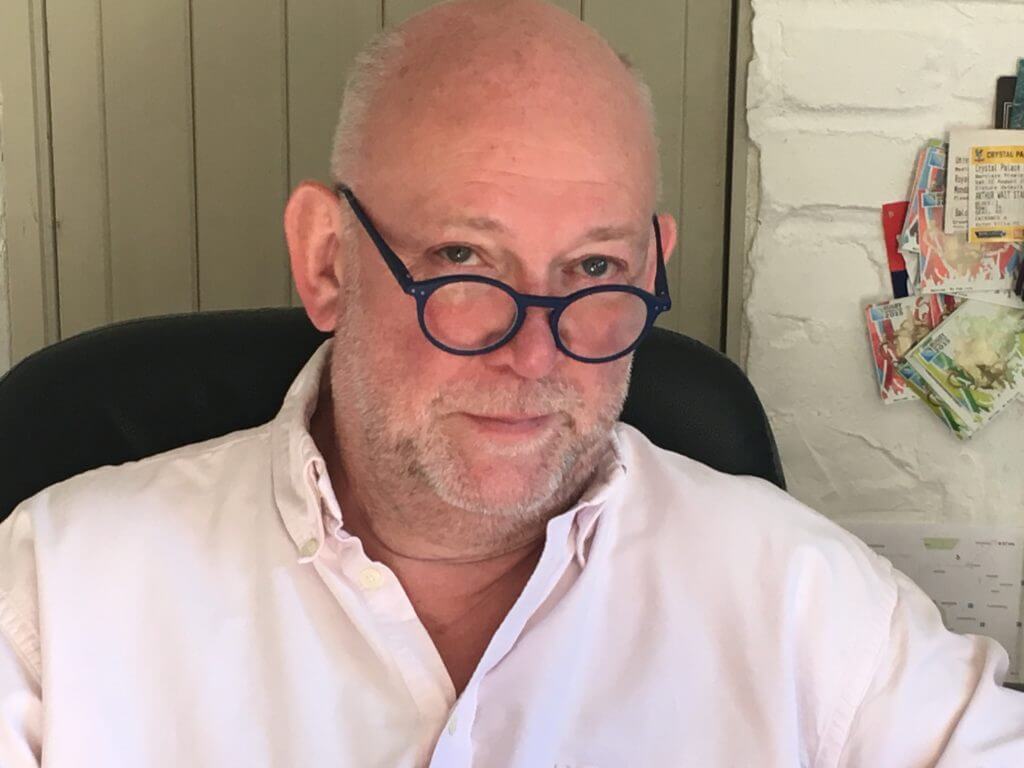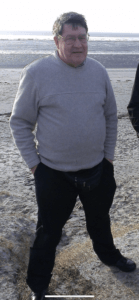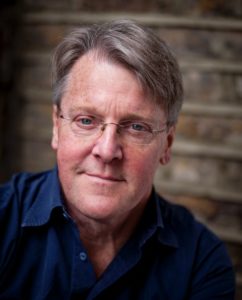
Please find on these pages obituaries of Old Paulines who left the school between 1970-79.
The Rev David R (Roly) Bain (1967-71), 1954-2016
When my brother Roly gave up his Anglican parish ministry at the age of 31 to become a clown, nobody could have guessed that his untimely obituary would run at length in every national newspaper.But such was the impact his unique clown-priest ministry was to have.
It was at St Paul’s that a 15-year-old Roly had the defining experience of his life, when a football tour was cancelled and he decided to accompany his triplet brother Toby to a Christian Union house party instead. It was, he recalled in his book ‘Playing the Fool’, ‘both fun and holy and thus profound’.
The same could be said for his ministry, which he saw as in a tradition dating back to the medieval feast of fools. Roly used the props, language and trained showmanship of clowning in the service of a Christian message, travelling 30,000 miles a year and reaching as far as the US and Australia.
He was hosted by churches of many denominations, and also by schools, hospitals, and prisons across the UK, touching people whom churches could not reach. He revelled in debunking stuffed-shirt religion, claiming that he had “custard-pied ten bishops – and most were grateful”.
After studying theology at Bristol University and Cuddesdon, Roly was succentor at Southwark Cathedral where in 1984 he married Jane (they separated in 2008). He had been vicar at Tooting for six years when he took the momentous decision to train as a clown in Bristol, where he helped to found Holy Fools, a group of like-minded performers.
Roly latterly took over many duties in his parish of Olveston, where for 10 years until 2015 he tirelessly visited our mother in a local care home. His triplet sister Jennie died in 2012. He is survived by sons Jack and Sam, and Old Pauline brothers Toby, Simon and half-brother Ben. A memorial service was held at Southwark Cathedral on All Fools Day, April 1.
Written by: Simon Bain (1965-69)
Simon P Dexter, (1970-75)

Simon lived for most of his life in Smallfield, Surrey and started his education at the local primary school. Academically he was very talented, winning a Foundation Scholarship to St. Paul’s School when he was ten and an Exhibition to Corpus Christi College, Cambridge in 1976 to study Natural Sciences. After graduation he trained to be a Chartered Accountant with Josolyne Layton Bennett & Co and Arthur Young McClelland Moores & Co. After completing his training, he joined Aqualisa Products Ltd. in 1982 and was promoted to Financial Director in 1992. He retired from Aqualisa in 2016. A former Managing Director of Aqualisa Products described Simon thus:
“What was clear from the very start was Dex’s complete love for and commitment to Aqualisa; he understood the soul of the business and would do anything to preserve it. He was quite prepared to fight his corner and support his team but also recognised the need for change and that business is always challenging. Simon worked unbelievably hard but was present at every company event. He knew many of the customers and suppliers and could give good advice on how to deal with them: he knew when to push and when to quietly give in. Simon was respected, liked and admired by everyone who worked with him”,
Simon’s first sporting love was cricket and he played regularly for Smallfield Manor Cricket club for many years serving as Treasurer for most of this period.
Sadly, Simon was diagnosed with Myeloma in October 2017 and lost his battle with this disease this March. Simon leaves his sister Stephanie, brothers Amos and Timothy and ten nephews and nieces. He has been the rock of his close family. We invite tributes and memories to be left on his memorial website https://www.forevermissed.com/simon-peter-dexter/about
Written by: The Dexter family
Anthony (Tony) E W Dux (1966-71), 1952-2022
Born on the 18th December 1952, Anthony started at Colet Court as a scholar in 1960 and was part of the cohort of pupils that moved with the school from Hammersmith to its current location. He started at St Paul’s in 1966, leaving in 1971 to study medicine at the Royal Free, following in his mother’s footsteps.
He qualified as a medical doctor in 1977and went on to specialise initially in paediatrics before focusing his specialisation on radiology. His first Consultant position in Radiology was at Peterborough before he eventually moved to Leicester, where he was able to combine his interest in paediatric medicine with radiology. His passion for medicine never left him and, even after his retirement from the NHS at 60, he continued working notwithstanding his failing health.
Sadly, his final years were blighted by illness and yet he remained interested in current affairs, music, the arts and rugby union – particularly Leicester Tigers. His passion for good food and wine was legendary.
Tony was someone of huge intellect. He was blessed with a phenomenal memory which never deserted him. He was a hugely popular figure both at work and in his local community.
He was married to his wife Sally for over 40 years and they had two children, Emma and Marcus. He also leaves behind three grandchildren and two sisters. He will be greatly missed by us all.
Written by: Liz Dux (sister)
Nicholas J Hayman
(1971-75)
At prep school, Nick was a good-looking blond-haired boy, academically capable and good at sports. But it was his vivacity and infectious enthusiasm that made him stand out and become so popular.
At St Paul’s, Nick had a cool, long hairstyle and was one of us who frequently fell afoul of Messrs Perkiss and McGuiness on the hair-length test. He found his favoured sport and became captain of Squash, pushing on to regional competition. The sense of adventure that would rule his life, and his passion for two-wheeled excitement was developing and saw the two of us cycling from London to the South-West coast of France and back alone at the age of sixteen.
Nick read Mathematics at Bristol for two years but decided instead to explore computing with Honeywell. Meanwhile, he had started motorcycling, now able to go further afield in adventure and much faster. On an early trip to America, Nick met Grace and within months was starting life with her in San Francisco, finding work at a well-respected motorcycle dealership. He was an intelligent and gifted mechanic and deployed his natural charm with the shop’s customers to great effect.
Spare time was spent riding the roads or dirt tracks of the West Coast and Central America or on the AMA (American Motorcyclist Association) racetrack circuit where he proved to be highly competitive and very successful over many seasons.
In the nineties, Nick and a colleague mechanic were able to buy the business and developed it rapidly into the top US Ducati dealership with its own racing team – in no small part due to Nick’s astute management, drive and enthusiasm. It continues to prosper. Latterly, he was able to step back from work and continue to explore the world more fully, often on two wheels, one of a rare breed of those who live life to the full.
Francis Lovell (1971-1975)
Robert F Lees (1970-74), 1957-2020

Rob arrived at St Paul’s in 1970 as a voracious reader and thrived under the tutelage of Brian Robson and Harry Quinn. After reading English at Pembroke College, Oxford, he emerged in 1978 with a relentless curiosity, a keen appreciation of good beer, and a group of friends which never stopped expanding.
Rob was rare in being both creative and logical, an intellectual and a ‘doer’. So, when it came to career choice, there were plenty of options. He decided to enter business, focusing on IT. One result was that he worked on many innovations we now take for granted, from barcodes to SMS texting. Another, at Vodafone, was the tense New Year’s Eve he spent navigating the company through the infamous Millennium Bug. Later, after gaining Chartered status in the procurement field, he moved into consultancy, serving the London Metal Exchange among other City institutions as well as the Ministry of Defence.
Rob’s teams knew him as an outstanding boss and mentor: sharp, often challenging, but always generous with time and advice. And once away from work, no-one was better company. Passionate about both music and sport, he also delighted in model car ‘slot racing’, relishing the chance it affords to engineer ‘stuff that works’.
Above all there were, and are, his wife Sonia and their children. A chance meeting in Devon initiated Sonia and Rob’s life together. Adam, Katy and Tom’s arrival soon followed, as did countless happy times shared across Cornwall, Somerset, and Wiltshire.
Another passion was cycling. Rob loved being out on his bike – and it was while riding that he first realised something wasn’t right. He was diagnosed with cancer, which sadly overpowered him in October 2020 after a short, brave battle.
It was typical of ‘the big man’ that he continued to make plans until his last day. He even specified a ‘final overture’ of voice recordings for his funeral – culminating in a sentiment that perhaps helps explain why his memory will be so cherished. “It’ll be alright in the end. And if it isn’t alright, it’s not the end.”
Written by: Hugo Kondratiuk (1970-74) and the Lees Family
John L R Melotte (1958-2020)
John Melotte was very clever though modest, a successful professional and entrepreneur who cared as much for the well-being of his workmates, and a keen sportsman who was happiest seeing others succeed.
The son of a general practitioner, John was born at home in Feltham in West London, the younger brother of two sisters.
John and I first met at Kings House School in Richmond when we were eight – a quiet thoughtful boy with an improbably early moustache and an unusual gait when he ran. It was immediately clear that he was academically and musically gifted, top of the class and regaling us to Acker Bilk and The Beatles on the clarinet.
He won a scholarship to St Paul’s School and continued to thrive academically. He became a prefect, and it was in Barnes that began his lifelong love of rowing, joining the crew in the 1st VIII – I’m better sitting down than running, he said.
John then won a scholarship to read Mathematics at Exeter College, Oxford, where he rowed in the College First Eight throughout his three years and was a very successful College Captain of Boats, winning blades twice. Typically, he later confided that he derived most satisfaction from persuading us to give rowing a try and then coaching us to our own modest success and great enjoyment.
After his time at University John continued to row at Molesey Boat Club and during this period he coordinated the formation of the Exeter College Boat Club Association, helping to keep alumni in contact with each other and with the College.
John’s working life started in IT, initially as a software engineer but he soon moved into management, and, having prepared the successful sale of one company of which he was a director, into the world of mergers and acquisitions with spells living in the United States. He continued to help young companies seek finance and support as a consultant but returned latterly as a director of a burgeoning systems company.
When daughter Alice joined in 1996, John became a supporter and committee member of Teddington Swimming Club, including a period as Chair. He then joined the Swim England London Regional Management Board and in 2012 was appointed Regional Chairman.
John had a quick and incisive mind and remarkable organisational skills which he was able to use to great effect at work but also to help others. He was always quietly guided by compassion and by what was just, and was extraordinarily generous with his time and means, and with his friendship.
John is survived by his wife Julie and three daughters Alice, Sarah and Katherine, and two grandchildren.
SPS : Francis Lovell (1971-1975) and Richard Powell
Anyone wishing to remember John may donate to either of the charities that reflect two of his passions in life, rowing and singing: Love Rowing and The Choir With No Name
Christopher Vaughan Middleton (1967-71), 1954-2022
Many who were at St Paul’s in the late 60s and early 70s will remember Chris Middleton well.
Chris grew up in Ealing. His elder brother Nigel was also a Pauline. Chris attended Durston House in Ealing, where he was head boy, and won a scholarship to St Paul’s. He started in the Remove, before entering the Classics VIIIth Form in the days when Dr Cruickshank was head of Classics. Chris was an enthusiastic and active sportsman, and a successful opening fast bowler with the first XI. It was believed that Chris was the youngest member of the First XI at least in living memory at the time. He was also one of those who made F-Club a strong force in inter-club sport. He enjoyed music and drama, and successfully took the lead role in a school production of Zigger Zagger. Chris was known among his contemporaries for his lively sense of humour, and his gift for witty insight and observation. He pursued his interests actively outside school as well, he played in a Sunday league soccer team as well as playing rugby at St Paul’s, and he memorably played a role in a production of The Crucible at the Oval House Theatre which was staged by a group including several Paulines and Paulinas.
Chris was notably precocious and took his O-levels at 13 and his A Levels at 15. He was still only 17 when he was awarded an exhibition to read Classics at Trinity College, Cambridge.
After graduation from Cambridge Chris became a journalist, he began work at a local paper in Uxbridge, and went on to become a freelance columnist and writer. For over 25 years he contributed many articles to the Daily Telegraph. His work included the “Modern Manners” column of social commentary (some of the articles were published in his book “Behave”). Other regular subjects were travel and property, and Chris was named Property Writer of the Year in the 2005 Press Awards. As a freelance he contributed to several other publications in Britain and overseas, ranging from Record Mirror, Radio Times and Reader’s Digest to Country Homes & Interiors, Sainsbury’s Magazine, What’s On in London, Saga magazine, the Bombay Sunday Standard and the Lucknow Pioneer.
Chris also co-wrote and co-performed comedy at the Edinburgh Festival, and helped to create a BBC children’s television series, Space Vets. His writing was done in his office in the garden shed at home in Wimbledon.
Chris married Sarah Wynter, an actress, and they have three children, Julia, Eleanor, and Charles, who have spoken appreciatively of Chris’ positive support for them as a father.
One lifelong passion from boyhood was football, both supporting Brentford football club, and playing: several contemporaries enjoyed the football practices that Chris organised in local parks in Ealing, and on occasions in the winter as well as playing rugby at St Paul’s he was in a Sunday league football team. Another passion was music, especially the guitar. Another was travel: Chris made several adventurous overland journeys with friends in the 70s, to places like Greece, Turkey, India, Nepal, Iran, Hungary, Roumania, Czechoslovakia and the Soviet Union. On one trip to Crete, football and travel came together: Chris visited his former Greek teacher Martin Hammond in a village in Southern Crete, and scored six goals in a local football match between that village and another one: so he was the local hero that night at the village wine festival.
Very sadly, Chris was diagnosed with fronto-temporal dementia in 2017, and this increasingly affected his last few years. He died on 20th April 2022.
Chris will be remembered as a friendly, lively, and inspiring presence for those around him, as someone who lived life to the full and strove to enable others to do the same.
Contributions from Chris’ family and friends, compiled by Stephen O’Brien (1967-71)
Richard B Morris (1967-70)
22 November 1952 – 10 August 2023

Richard Brian Morris, born 22 November 1952, passed away unexpectedly in his family home on 10 August 2023.
Richard obtained a degree in Material Science from Queen Mary University of London, which paved the way for his career in engineering. He began as an aerospace engineer for the renowned supersonic airliner Concorde. Richard thoroughly enjoyed working and travelling on Concorde and had vivid memories of the incredible speeds the aircraft could achieve during flight. He also cherished the memory of the in-flight meal, which he described as the best lobster he had ever tasted.
Richard’s engineering talents were utilised in various military and domestic applications. He was a generous man who provided opportunities to those who would not have been able to achieve their goals and dreams without him. Richard’s favourite job was working on communication antennas at Cooper Antennas, where he enjoyed using his problem-solving skills and forged close relationships with his co-workers.
Richard loved travelling the world, experiencing new cultures, savouring different cuisines, and making new connections with people. One of his fondest memories was skiing with his beloved wife, Julie. He would often chuckle and recall how she could never manage to stay on her feet.
Richard was a devoted family man who always ensured the family history was handed down to the next generations. His grandchildren, Kiera and Layla, were the light of his life, and he enjoyed teaching them about various topics, ranging from butterflies and snails to fossils and everything else the world has to offer. Richard was genuinely loved, and he will be deeply missed by all his family and friends.
The Richard Morris Family
Jonathan Edward David Richmond (1971-76), 1958-2020

Jonathan in Bangladesh; he worked in Dhaka, 2009-2010 as a Transport Advisor for the Government
My older brother Jonathan died suddenly and unexpectedly in January, aged 61, probably due to a cardiac arrest. He died in Lowell, Massachusetts, USA, where he had been living for approximately nine years.
Jonathan attended St Paul’s School (as a day pupil) between 1971 and 1976 where he received an excellent education; he was proud of having attended the School and remained in contact with his friends from that period. I can still remember his leaving our house in Richmond each morning, in a rush and wearing his black school uniform, to catch the Overground train to Barnes.
Jonathan was a person of wide talents, highly numerate and analytically-minded (he did Maths A-level) and also a superb writer of English. His most passionate and lifelong interest was in transport. As a child, of course, he ran a model train set. As a teenager he would buy, and enthusiastically study, those book-sized timetables published by British Rail in the 1970s. He travelled the entire UK by train, just for the fun of the journey, taking full advantage of the ‘Merrymaker’ excursion tickets which were available at that time.
After the LSE (where he gained a BSc in Economics), Jonathan won a Fulbright Scholarship to study at the Massachusetts Institute of Technology, where he gained an MSc in Transportation. His PhD dissertation examined the way transport planners arrive at their decisions. Jonathan argued that, in addition to technical analysis, planners are subject to the power of metaphor and even myth (especially in relation to the magic of trains). Transport of Delight, based in part on this doctoral research, was published in 2005; as one reviewer wrote, Jonathan ‘carves a new.. niche that only he seems to occupy: transport anthropologist’.
Jonathan’s career was rich and varied. He taught at many universities including Harvard, Sydney, Reading and the AIT (in Bangkok). As a consultant, he worked for the governments of Mauritius, Bangladesh and Ethiopia. More recently, he founded a non-profit organisation – Take-Off Space – to support disadvantaged high school students with applications to top-level universities; the first cohort, mentored by undergraduates, has just achieved some fantastic results.
In his extensive travels, Jonathan made many friends and acquaintances with whom he was constantly in touch. It is no exaggeration to say that his death was a worldwide event, generating warm messages and appreciative tributes from every corner of the globe. Jonathan also leaves behind his parents, siblings, nephews and niece. We all miss him intensely.
Written by: Sarah Richmond
Robert J Silver (1969-73), 1956–2019
I met Robert on our first day in Miss McLaren’s form. 1A was on the ground floor of the old Victorian Colet Court in Hammersmith. We were in the same class for the next ten years until he left for Trinity College, Cambridge, with a history scholarship.
Robert’s early years showed great promise. He had a fabulous memory, was a ferocious conversationalist, an avid debater (President of the Chesterton Literary and Debating Society) and a trenchant writer. In our younger days we shared an enthusiasm for tri-tactics, a wonderful board game putting the player’s memory and tactics across land, sea and air to the test in an endless replay of World War I. As we grew older we both became fascinated by history and current affairs but Robert’s knowledge of the inter-war years and his soft socialism and concern about fascism were something else. His prodigious memory displayed to me most recently just before he died when he reeled off the 50 states of America in alphabetical order.
At Cambridge his journalistic and political enthusiasm brought him friendships with Oliver Letwin and Charles Moore, both of course destined for fame. If mental illness had not intervened I have no doubt that Robert, too, would have had a distinguished career as a journalist, lawyer, campaigner and possibly an MP.
At Cambridge he had started down that path at the Union and as editor of the Fabian Magazine. But, sadly, in his last year at university things began to unravel. Without any experience of mental illness it was hard for his friends to understand the gently increasing anxiety, irrationality, lack of social awareness and, later on, paranoid delusions. Schizophrenia had invaded him, as I now understand it so often does to people in their early twenties with the susceptibility and the circumstances. Robert managed it well for several years and was called to the Bar, but practising never became possible. For ten more years Robert wrote interesting and punchy articles for the New Statesman, Spectator and other quality papers, especially obituaries for the Times.
In the same period he began a PhD, supervised by Zara Steiner, looking at voting patterns and British Zionism and Fascism in the ‘30s. He was also an active member of the Hammersmith and Fulham Labour Party and put himself forward as a Parliamentary candidate.
But for the last half of his life focussed work was not a possibility and, hugely sadly, his friends watched as he was sectioned under the Mental Health Act seventeen times. Robert was the most gentle and peaceable man but when he asserted his freedom by refusing to take his medicine, he would end up attracting attention. Happily, with the support of a fantastic social worker, his last four years were calmer and he was never again sectioned.
For most of the time he lived quietly as a well-known figure in a neighbourhood just off The North End Road – a few hundred yards from where we had started at Colet Court long before. Just after he died I met a woman who lived in the same neighbourhood. She said with great warmth and affection that she had chatted to him many times as he held court to passers-by, sitting cross-legged and chain-smoking on the front steps of his house, characteristically without socks and shoes or even a jumper or jacket in mid-winter, often with an immaculately groomed local Siamese cat on his lap, in contrast to his own careless déshabillé.
A true individual, sometimes exasperating, Robert remained an important feature of my life – and that of other Old Paulines, Tom Hayhoe, John Reizenstein and Rebecca Fitzgerald – till the end. We all kept in touch by phone – Robert eschewed email and the internet – and regularly celebrated his birthday, 23 April, which he proudly shared with Shakespeare and St. George. He will be missed and should be remembered for his enthusiasms, energy and courage.
Written by: Peter Freeman OP (1969-73)
Christopher J N Stanton (1970-76)

Christopher “Harry” Stanton left St Paul’s School for Hull University where he studied English & Drama. Initially intent on working on the technical side of the theatrical world he gained his Equity card via Theatre in Education. In 1983 he got his dream job at the BBC, working as Assistant Floor Manager on shows such as Blue Peter and Top of the Pops. In 1988 he quit the BBC to pursue a career as an actor. Roles in radio and television followed, one of his favourites being the dippy headmaster in CBBC’s popular series M.I. High. This opened the door to pantomime, a genre he thoroughly enjoyed and to which he was intrinsically suited.
Amongst his numerous and wide-ranging interests Chris was an avid sports fan and keen participant; having rowed at school he took this up again on his return to London. He met his future wife, Erica Allason-Jones, playing badminton. Later he took up real tennis, playing regularly on the court at Marylebone Cricket Club. On moving to South London he was introduced to Tooting Lido which became his second home; he swam all year round, whatever the weather, becoming a hardened cold-water swimmer although the main attraction was probably the after-swim ritual of tea, toast and chatting. An experienced cyclist, he took up running in order to join Erica in triathlon. It was during such an event on their tandem in the summer of 2018 that he realised he needed to see his GP and was subsequently found to have mesothelioma.
Chris had a remarkable gift for friendship, retaining close friends from his days at school, university, work and “life”. His exuberant sense of fun is captured in the Lido Song (https://www.youtube.com/watch?v=niUPP5MPAow), written and performed by Chris Stanton with a little help from some of his many chums, all of whom miss him terribly.
Chris leaves his wife Erica and half-sister Alex.
Written by: Erica (widow) and friends
Dietrich W F (Wennemar) Von Bodelschwingh (1968-73), 1955-2020
Wennemar von Bodelschwingh, born on January 22nd 1955, died on August 25th 2020 due to a brain cancer.
Wennemar grew up in Munich with his twin sister and three older sisters. Regular walks and excursions with the family into the countryside and mountains awakened his passion for nature at an early age. In 1966, the family moved to London, where Wennemar’s father, Dr. Heinz von Bodelschwingh, worked for Siemens. Wennemar went to Sussex House Preparatory School in London until 1968 and then to St Paul’s School until 1973. During his school years, Wennemar often cheered on his favourite football team, Chelsea.
In the 1970s, he enjoyed his zoology studies at Queen’s College, Oxford, to the full. His professional career began with a Traineeship in Banking at J.Henry Schroder Wagg & Co. Ltd. in London and took him to Bayerische Vereinsbank in Munich then to Insead in Fontainebleau (MBA) and to Deutsche Bank in Melbourne and Frankfurt where he worked in Corporate Finance.
In October 1994, he married Annette Scheiff with whom he was happily married for 25 years and had two sons. He spent many summer holidays with his sisters in Sweden. He worked at Eurohypo AG where he worked for Investor Relations from 2003 until 2015. His passion for ornithology lured him to many distant countries in recent years. There, observing the birds made him very happy. Wennemar was a modest, humorous and loving family man.
Written by: Wennemar’s family